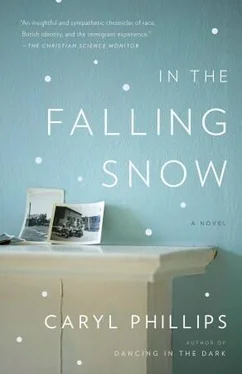Ruth says nothing, and awkwardness overtakes them both. He realises that he probably sounds immodest, but it is too late now. Suddenly he is conscious of the presence of the telephone in his hand, and he longs for her simply to ask him what he is doing with his time, or make a joke, or tell him that the photocopier in the office isn’t working, but she remains silent.
‘Has Clive asked after me?’
Ruth seems momentarily surprised.
‘Mr Wilson?’
‘Yes, Clive Wilson.’ He laughs now. ‘The boss.’
‘No, he’s not said anything. You know what he’s like.’
He regrets having mentioned Clive, for it makes him appear anxious and weak. However, this is not how he feels, nor is it the impression that he wishes to convey to his secretary. Having closed the telephone he finds it difficult to reapply himself to the words on the screen. He would still like to write a few paragraphs on Gil Scott-Heron, but he wonders how much, if anything, his potential British readers will know about the chocolate cities and vanilla suburbs of the United States? If they don’t know anything then it will be impossible for him to develop his thesis about how black cultural heritage is passed on from one generation to the next. After all, he can’t illustrate the principle by pointing to Liverpool or Birmingham. Okay, so the Romans brought black soldiers to build Hadrian’s wall, and there were black trumpeters and pages in the sixteenth-century courts of England and Scotland, and everybody knows that eighteenth-century London was full of black people, but that was then. He is trying to write about a deeper and more substantial tradition of cultural inheritance, and this means that he has to look across the Atlantic for his models. Of late he has found that the same is also true in the race relations business. Increasing numbers of social policy papers seemed to cross his desk arguing that one can only understand Bristol or Leicester or Manchester by looking at Oakland or Detroit or Chicago. He switches off his computer and admits defeat for the day, but he had worked well until Ruth called. Now he has time on his side.
By quarter past four it is apparent that everybody has left the building. There are no longer any students ambling down the steps before peeling off to the left or right in search of a bus, and nobody else appears to be emerging from inside the school. It is not raining, but he stands beneath the red awning, although he now admits to himself that he is wasting his time loitering on this far side of the road. Today he will use the pedestrian crossing. He waits until the beeping begins, and the little green man appears, before dashing quickly in front of the idling traffic. There is still no sign of her and so he decides to go inside and see if he can locate some kind of administrative office. Yesterday she chose not to come back to his Wilton Road flat, and having walked her to the bus stop, and thanked Danuta for having coffee with him at McDonald’s, he watched her get on the bus. It was his bus too, but he decided to walk back in the rain, without an umbrella, and think about what a strangely pleasant distraction the girl was. However, when the skies really opened he realised the extent to which rain could hurt, for the heavy drops felt like needles of glass. By the time he reached home he was drenched to the skin, so he took a long hot shower to prevent himself from catching a chill, and then he kicked up his legs on the sofa and spent the evening continuing to think about Danuta, or his book, jumping nimbly in his mind from one subject to the other, happy to be able to focus on something other than the situation with Yvette and the frustration of not knowing when he will be able to return to his job.
The unfriendly woman looks up from her desk and peers at him over the top of her glasses.
‘Can I help you?’
It is the end of the day, and it is apparent that she is the only one left in the reception office of the language school.
‘I’m looking for somebody. A friend.’
The woman peels off her glasses and places them on her desk. She stands and crosses to the hatch. He guesses that she is in her late fifties, and almost certainly a spinster. There is no sign of a ring, and no hint of sensuality to her.
‘And does your friend have a name?’
‘Danuta.’ He pauses. ‘She’s Polish.’
‘I take it you’re not with any official organisation? Immigration? Housing?’
‘I told you, I’m just a friend.’
‘Then I’m afraid I can’t help you. Students come and students go, but we have to respect their privacy.’
He smiles and nods.
‘Yes, of course, I understand what you’re saying, but it’s just that I arranged to meet her. Today at four o’clock, and I’m worried because she’s not here.’
‘Have you tried calling her?’
He stares at the woman.
‘Well? You do have her number, don’t you?’
In the evening it starts to rain hard, lashing, stormy rain. He sits at his laptop and types ‘Danuta’, then ‘Polish’, then ‘London’, then ‘language school’, then ‘cleaning agency,’ and hits the return button, but he is offered a choice of an expensive maid service near Marble Arch or two escort agencies. There are some websites in Polish, but these are of no use to him, so he tries again, but this time for an image search. There appear to be many Danutas of all sizes and ages, but nobody that he recognises. Then it occurs to him that perhaps Danuta is not even her real name. He cut the conversation with the unfriendly woman short, for she clearly regarded herself as the commissar of the language school and there was nothing to be gained by arguing with such a woman. Once he abandoned the office hatch, and left the language school, he caught the bus to the library where he sat for nearly two hours staring at the door in the hope that she would walk in. He thought about simply asking the librarian if she had seen the strange Polish girl who usually arrived with a dictionary and a copy of the Evening Standard , but he worried that the woman might regard him as some kind of stalker. He was sure that the librarian would know who he was talking about, and if Danuta had signed up for a reader’s ticket then her real name and address would be on file, but by the end of his second hour of gazing at the door he had convinced himself that her ‘disappearance’ was not his problem, nor his fault, and he should just get on with his own life.
He tries another web search, this time typing in ‘Danuta’ and ‘Warsaw’ but again there is nothing. He logs into the wine warehouse site and types in his username and password. Clicking on past orders he deposits a dozen screwtop bottles of Sauvignon Blanc into his basket and then quickly checks out. She seemed to like this wine, and he wants to be ready. As he waits for the order to process, he stares out of the window into the black night where he can see that the few leaves that remain on the trees are now falling like confetti. The rumble of distant thunder is now complemented by lightning, which sporadically illuminates his living room, and he can hardly believe that a second storm is brewing.
The following morning the sun is out, although a stiff wind blows litter so that the empty crisp packets and plastic Coke bottles swirl crazily about the Acton street. He leans casually against the wall at the foot of the steps that lead up into the language school, and then he sees her. Danuta is walking slowly and is bent forward into the head wind. When she reaches the school he moves away from the wall and blocks her path.
‘I was worried about you.’
She looks up at him and scrutinises his face.
‘You didn’t show up yesterday. Neither here nor at the library. I was working on my own stuff but I was finding it hard to concentrate.’
Читать дальше









![Unknown - [Carly Phillips] The Bachelor (The Chandler Brothe(Bookos.org) (1)](/books/174132/unknown-carly-phillips-the-bachelor-the-chandle-thumb.webp)


